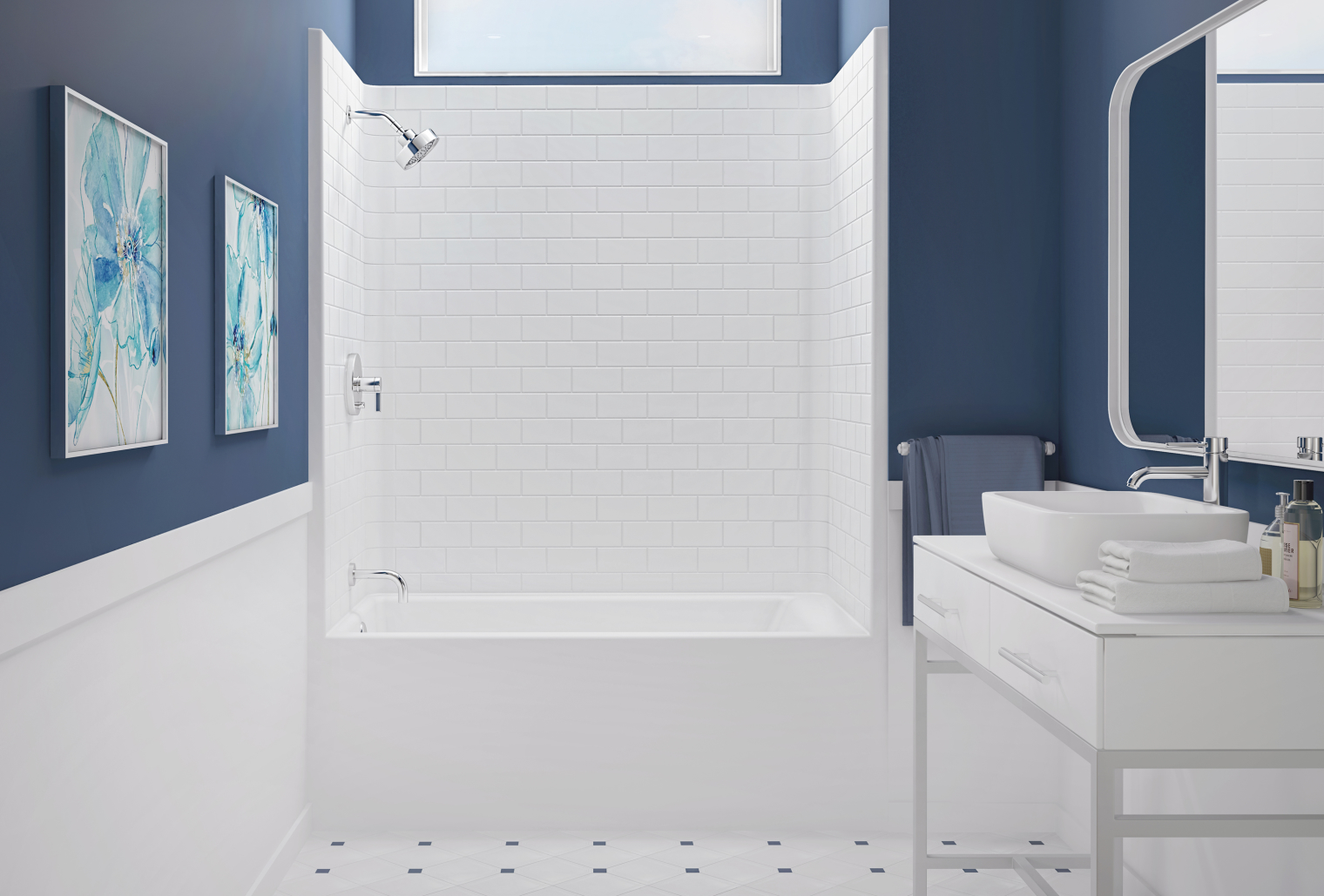Want to upgrade your bathroom without a major remodel? An alcove shower might be the perfect solution. This comprehensive guide covers everything from basic definitions and dimensions to design inspiration and accessibility considerations, helping you create the shower of your dreams.
Discovering the Alcove Shower
What exactly is an alcove shower? It’s a shower enclosed on three sides by walls, creating a recessed, space-efficient showering area. This classic design is a natural fit for most bathrooms, especially those where space is at a premium. It’s like a pre-built shower zone, just waiting for your personal touch. You’ll often find them tucked away at the back of the bathroom or along one side, wherever those three walls happen to be. If you enjoy a relaxing soak, you can even combine an alcove with a bathtub, creating a space-saving combo perfect for smaller bathrooms. This setup, often called a tub-shower combination, provides the best of both worlds.
[https://www.wavesold.com/beadboard-ceiling-panels]
[https://www.wavesold.com/barn-door-hinges]
Sizing Up Your Space: Dimensions and Layouts
Alcove showers come in various standard sizes to suit different bathroom layouts. Compact models around 32×32 inches are ideal for small guest bathrooms or tight spaces. A standard 36×36 or 48×36 inch shower is a comfortable choice for most bathrooms. Larger options, like 60×32 or 60×36 inches, offer a luxurious experience in spacious bathrooms. If none of these fit your unique space, many manufacturers offer custom sizes.
| Shower Size | Dimensions (inches) | Best For |
|---|---|---|
| Compact | 32×32, 34×34 | Small bathrooms, guest baths, limited space |
| Standard | 36×36, 48×36 | Most bathrooms, comfortable for average users |
| Spacious | 60×32, 60×36 | Larger bathrooms, extra room to move around |
| Custom | Varies | Unique layouts, maximizing available space |
Choosing Your Kit: One-Piece vs. Multi-Piece
Two primary types of alcove shower kits exist: one-piece and multi-piece. One-piece units are pre-fabricated for quick and relatively simple installation. They’re a great choice for a streamlined process and straightforward design. Multi-piece kits offer more customization. You can select the base, walls, and door separately, giving you greater control over the final look, perfect if you have a specific design in mind.
Material Matters: Walls, Bases, and Doors
The materials you choose significantly impact your alcove shower’s appearance, durability, and maintenance.
Shower Walls:
-
Fiberglass: A budget-friendly and durable option, fiberglass is lightweight and easy to install, making it suitable for DIY projects. However, it can be prone to scratches and may not feel as sturdy as other materials.
-
Acrylic: Similar to fiberglass but with a slightly more upscale look and feel, acrylic is durable and resistant to chipping and cracking. It’s typically more expensive than fiberglass.
-
Tile: Tile offers endless design possibilities with a vast array of colors, patterns, and textures. It’s ideal for creating a truly custom look. However, tile installation can be complex and may require professional help.
-
Stone Resin: For a luxurious and seamless shower, stone resin offers a sleek, modern aesthetic and is incredibly durable and easy to clean. It provides a spa-like experience but comes with a higher price tag.
-
Composite Stone: This engineered material mimics the appearance of natural stone like granite or marble, offering durability and low maintenance at a more affordable price than genuine stone.
-
Solid Surface: Solid surface materials provide a smooth, seamless look, are highly durable, and often repairable. This premium aesthetic comes at a premium price, making it the most expensive option.
Shower Bases:
Shower bases, also known as shower pans, are the floor of your shower stall. They come in various materials:
-
Fiberglass: Budget-friendly, lightweight, but potentially less durable.
-
Acrylic: Durable, easy to clean, available in various colors, but more expensive than fiberglass.
-
Composite: Strong and durable with design flexibility, but can be heavy and may require professional installation.
-
Stone Resin: Luxurious appearance, seamless and durable construction, but comes at a higher cost.
Consider drain placement (left, right, or center) and threshold height, especially for accessibility.
Shower Doors:
The shower door completes the look and functionality of your alcove shower:
-
Sliding Doors: Space-saving and ideal for smaller bathrooms.
-
Hinged Doors: A traditional choice with a classic look.
-
Pivot Doors: Modern and sleek, rotating on a central pivot point.
Choose a door style and material (clear glass, frosted glass, acrylic) that complements your bathroom’s style and desired level of privacy.
| Material | Pros | Cons | Price |
|---|---|---|---|
| Fiberglass | Budget-friendly, lightweight | Can feel less sturdy, prone to damage | Low |
| Acrylic | Durable, easy to clean, variety of colors | More expensive than fiberglass | Mid-range |
| Composite | Strong, durable, design flexibility | Can be heavy, may require professional installation | Mid-range to High |
| Stone Resin | Luxurious look, seamless, durable | More expensive | High |
From Tub to Shower: A Bathroom Refresh
Converting an old bathtub into an alcove shower modernizes your bathroom and improves accessibility. A walk-in shower eliminates the high step-over of a tub, making it safer and more convenient, especially for those with mobility issues. This upgrade can add value and functionality to your home. Companies like Bath Fitter specialize in one-day tub-to-shower conversions.
Installation: DIY or Professional?
Installing an alcove shower kit can be a DIY project, especially with easy-to-assemble options. However, plumbing and tiling might require professional expertise. Assess your skills and the project’s complexity before deciding. Proper waterproofing and a level shower base are crucial to prevent leaks.
Maintenance: Keeping it Sparkling
Regular cleaning with appropriate products prevents soap scum and mildew buildup. Ensure proper ventilation to control moisture and prevent mold. Preventative maintenance extends the life of your alcove shower.
Alcove Showers vs. Corner Showers
Alcove showers are versatile and adaptable, working well in various bathroom sizes. They excel at utilizing wall space, making them ideal for smaller bathrooms or those with existing plumbing configurations. While corner showers maximize floor space and may offer more natural light, alcove showers provide greater design flexibility, especially for walk-in showers. Consider your bathroom’s layout, desired features, and accessibility needs when choosing between the two.
| Feature | Alcove Shower | Corner Shower |
|---|---|---|
| Shape | Usually rectangular | Neo-angled, curved, square, or rectangular |
| Space Usage | Adaptable to various sizes | Maximizes corner space, ideal for small square bathrooms |
| Natural Light | May receive less natural light | Potentially more natural light |
| Design | Highly versatile, accommodates walk-ins | Walk-in options can be more limited |
| Accessibility | Easier to adapt for accessibility features | Adapting for accessibility can be more challenging |
| Cost | Ranges from budget-friendly to high-end | Basic models are generally more affordable |
As Mike Foti from Innovate Building Solutions suggests, choosing the right shower depends on individual needs and bathroom layout. While corner showers are excellent for maximizing space, alcoves offer more design versatility.
Looking Ahead: Future Trends in Alcove Showers
Bathroom design is constantly evolving. Ongoing research explores new materials, accessibility features, and space-saving solutions. Universal design principles are becoming increasingly important, focusing on creating bathrooms that are functional and beautiful for people of all abilities. Eco-friendly materials and water-saving technologies are also gaining traction. As our understanding of user needs and preferences grows, alcove shower design will likely continue to innovate, offering even more functional and stylish options. Keep exploring the latest trends and advancements as you plan your bathroom project.
- How to Get Rid of Mushrooms in Your Lawn: A Complete Guide - April 24, 2025
- How to Get Rid of Ground Hornets: A Safe and Effective Guide to Eliminating Nests - April 24, 2025
- How to Get Rid of German Roaches Fast: DIY Methods for Quick Control - April 24, 2025










